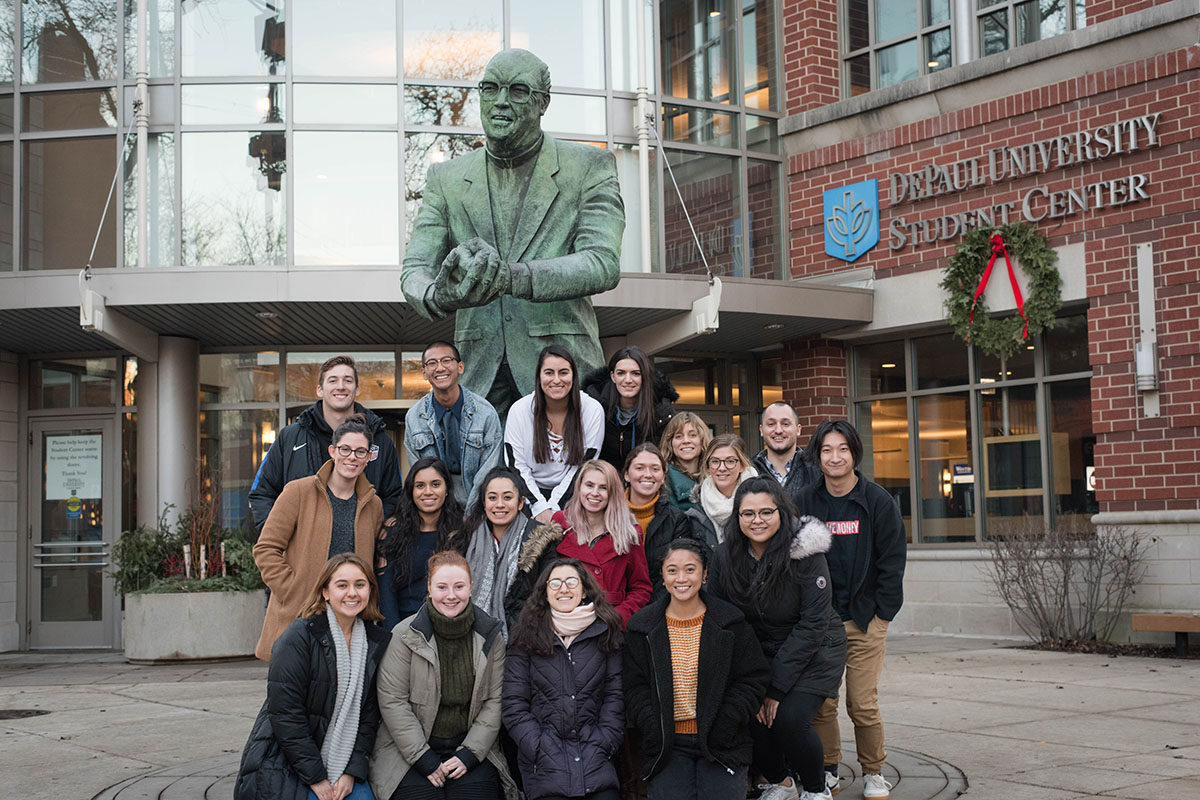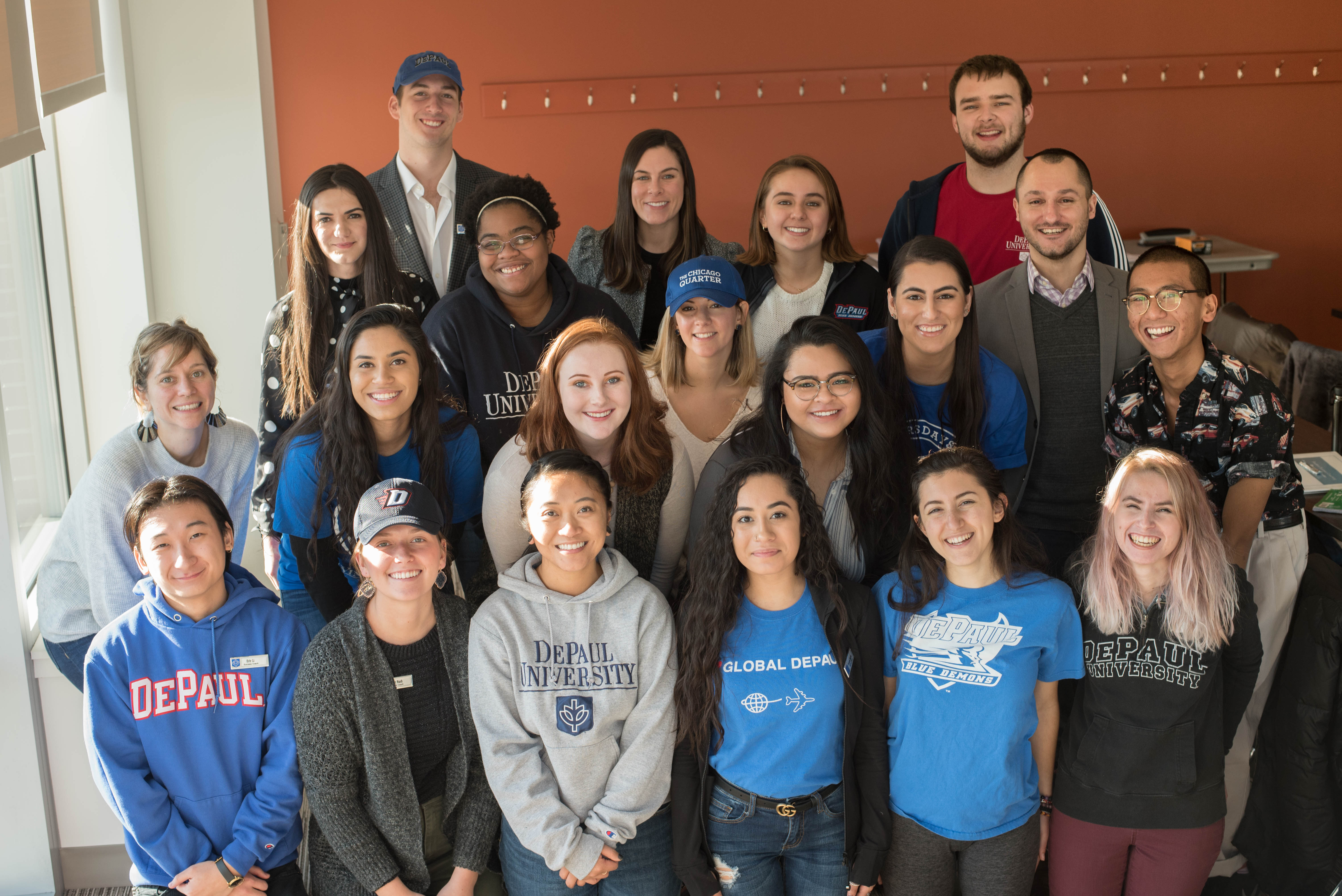 Upper-level students (some pictured above) gathered at the beginning of January for training to become coaches in New Student and Family Engagement's Student Success Coaching program. (DePaul University/Ashlee Schrock)
Upper-level students (some pictured above) gathered at the beginning of January for training to become coaches in New Student and Family Engagement's Student Success Coaching program. (DePaul University/Ashlee Schrock)
On Jan. 2, upper-level undergraduate and graduate students gathered in Arts and Letters Hall to begin a three and a half day training for their new jobs as student success coaches. Soon, these 21 students would become partners in goal setting, accountability and success for their share of the 2,400 first-year students invited to take part in the new Student Success Coaching program launched by New Student and Family Engagement.
Meant to augment the various existing advising and mentor programs and services at DePaul, the Student Success Coaching program is rooted in the university’s strategic plan and goals related to student retention. The program is one way DePaul is increasing programs and services related to retention in order to bring the institution’s already higher-than-average first year retention rate to 90 percent.
“This program aims to increase student retention in ways similar to the Chicago Quarter mentors, resident advisors, and STARS peer mentors, but Student Success Coaching takes a slightly different approach,” says Ashlee Schrock, a coordinator of retention and student success initiatives.
In the success coach relationship, a student’s goals can address any number of areas in their life, from study skills and career to relationships and healthy habits.
“When students engage with their assigned success coach, they bring their ideas of success to the table and together identify areas of improvement,” Schrock says.
That being said, coaches don’t provide academic or career advice, or counseling services, but instead help students develop measurable goals, direct students to university resources that support those goals, and conduct periodic check-ins to encourage and hold their coachees accountable.
“New students hear a lot during orientation and the Chicago Quarter about the many resources available to them at DePaul, and it can be overwhelming,” says Jack Gabrish, a junior health science major and coach in the program. “Our job is to listen to their challenges or goals, and to remind them of and direct them to appropriate resources at DePaul.”
Program development began in the fall and was informed by a coaching effort already under way in Adult, Veteran and Commuter Student Affairs aimed at DePaul’s student veterans.
“Ultimately, the program affords DePaul an opportunity to continue our commitment to Vincentian personalism,” says Rico Tyler, associate vice president for Student Affairs and member of the initial planning group for the program. “It’s an experience unique to the individual we hope results in success.”
The early January training brought staff from across the university together to train the coaches on topics such as Strengths, SMART goals, identities at the margins, mission and coping skills.
Schrock also developed communications around the program and a structure for the coaching interactions and coach supervision. Part of the structure includes success coach office hours. A number of coaches come together on Friday afternoons for a portion of their office hours, and nine of them recently took some time to discuss their role, the promise of the program and how coaching is going so far.
“I love one-on-one time with students, that’s why I became a resident advisor,” shares Genera Fields, a junior human service psychology major. “I wanted to be a part of the coaching program because I will potentially have more of an impact on their experience at DePaul.”
Most of the other coaches gathered that day agreed with Fields.
“One-on-one interactions with students at an institution as large as DePaul helps ensure no one gets lost in the mix,” shares Bethany Haug, a third-year graduate student in the College of Education’s counseling program. “It gives students an opportunity to talk about their challenges, rather than to just try and tough it out on their own.”
Coaches also found it important to let students know this program is for every first-year student.
“We’re addressing a wide range of inquiries and working with a wide range of students,” says Gracie Garbrecht junior in the College of Education. “Everyone should do this, and even if you don’t think you need it, you’ll probably benefit from it.”
So far, about 200 students have met with their success coaches at more than 300 appointments. Schrock says the coaches have been acting as a triage for students by hearing their concerns and connecting them to existing resources at DePaul.
Even though the program just launched, Schrock and the coaches are beginning to think about the future, including the possibility of opening the program to transfer students and conducting group sessions.
“We’re considering a number of possibilities as to how we can make this program more accessible to our students,” Schrock says. “We’re all very excited about the coaching program and its future.”
The Student Success Coaching program is funded through a generous gift made by an anonymous donor, as well as an allocation from the Grounded in Mission fund. To learn more, visit
the program website or contact
Ashlee Schrock.
 Upper-level students (some pictured above) gathered at the beginning of January for training to become coaches in New Student and Family Engagement's Student Success Coaching program. (DePaul University/Ashlee Schrock)
Upper-level students (some pictured above) gathered at the beginning of January for training to become coaches in New Student and Family Engagement's Student Success Coaching program. (DePaul University/Ashlee Schrock)